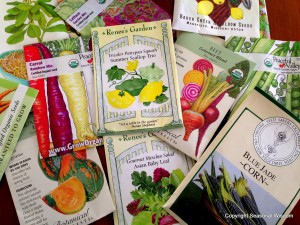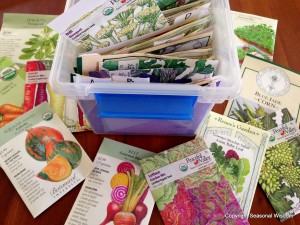
Each year, I end up with many more vegetable seeds than I could possible plant in my garden. So, I give them to friends. Or, I save them for the next growing season … or, the next growing season after that.
As a result, some of my seeds are several years old. Should I throw them in the trash? Not necessarily. To learn more, I did some research. Here’s what I learned about the average shelf lives of common seeds, and how long vegetable seeds stay viable.
Not Clear: It’s not always easy to know how long a particular type of seed will last, as Margaret Roach points out in this excellent post in A Way to Garden. She features an interesting chart that shows how expert opinions differ on seeds’ shelf lives.
Here are my rough estimates, based on advice from seed sources, gardening books and cooperative extension services. Sources are listed below.
How Long Will Vegetable Seeds Stay Viable:
| Vegetables | Average Shelf Life |
| Bean | 2-3 years |
| Beet | 3-5 years |
| Broccoli | 3-5 years |
| Carrot | 3 years |
| Corn, Sweet | 2 years |
| Cucumber | 5 years |
| Eggplant | 3-5 years |
| Kale | 4 years |
| Lettuce | 2-5 years (lots of debate!) |
| Muskmelon | 5 years |
| Onion | 1 years |
| Pea | 3 years |
| Pepper | 2 years |
| Radish | 5 years |
| Spinach | 2-3 years |
| Squash | 4 years |
| Tomato | 4 years |
| Watermelon | 4 years |
 Storage Matters: The way you store your seeds will determine how long they will stay viable.
Storage Matters: The way you store your seeds will determine how long they will stay viable.
Ideally, seeds like to be stored somewhere cool and dry.
Some people store their seeds in a jar in the refrigerator. But the authors of Heirloom Life Gardener, who own Baker Creek Heirloom Seeds, recommend that seeds be kept in an airtight container, such as a jar or envelope, in a dark, cool spot where the seeds won’t get any light or moisture.
My set-up isn’t fancy, but I keep my seeds in their packages and store them in this Seed Keeper in a dark, dry room that stays cool in my house. I won the Seed Keeper during a #gardenchat giveaway on Twitter years ago, and it has worked well for me.
What Do They Look Like? You can often tell whether the seeds are still good by their appearance, according to the Iowa State University Extension. So, give those seeds a peek before you plant.
Do the seeds usually look round and plump? Then they probably won’t “germinate well if they are pocked or wrinkled,” say these extension agents.
When in Doubt … Test: Still concerned? Give your seeds a germination test.
Select some randomly picked seeds, and spread them across several layers of premoistened paper towels. Keep them in a plastic bag or container somewhere warm. In a couple days, check seeds to see if they have germinated. Repeat every day for a week or so. Here’s how I presprouted seeds for faster growth in the summer, which is one way to help you test your seeds.
So, don’t rush out to throw away those old seeds. Check to see if they may still be viable, and be sure to sow a bit heavier, just in case. What are you planning to grow from seeds this year?
Get Growing: Here’s a Seasonal Wisdom mini-resource guide for growing food from seeds. Let me know if it helps you!
Seed Viability Sources:
Heirloom Life Gardener by the owners of Baker Creek Heirloom Seeds
Virginia Tech Cooperative Extension











{ 22 comments }
Excellent! I’ve got a few packets of old seeds that I’d stored in my shed for just over a year and I was sure that I’d have to chuck them. I’ll give them a go now
Thanks for your message, Hilary. I’m delighted this information was helpful to you. That’s exactly what prompted me to write this article. I wondered myself how long my seeds would last. Have a great gardening season, and hope to see you again. Teresa
Thanks! I have a ton from moving two summers ago and wasn’t sure if they were still good! I have all the seeds you listed and more. You saved me quite a bit of money!
Glad it helped, Amber. Have a great growing season. Teresa
Seed talk!! You know we love it!!
Thanks for using our Seed Keeper. Our method of storing seeds saves time and money. We love that it becomes a little history box of our gardens. As we leaf through the seed packs from previous years its a great reminder of what worked and what didn’t.
We are also big fans of the paper towel germination test!!
Sometimes seeds choose not to adhere to their expected lifespan. We think of old seed vessels that are unearthed and the contents still germinate after hundreds of years. The miracle of the seed!
Interesting! Seeds are miracles. Yes, your Seed Keeper continues to store my seeds well, but I had to move all the “seed history” to another box. Too many seeds. Isn’t it wonderful? Teresa
Nice post. I’ve got a picture in my photo gallery of things I planted last year(lettuce and bachelor buttons)that are 8 and 9 years old-with the seed packet right next to the pictures to show it. Love your site…Jim
Hi Jim: Thanks for your nice words. I appreciate it. Good for you for getting 8 and 9 years out of the same seed packages. You must have been storing them correctly! Teresa
Thanks for researching this topic! It’s something I always wonder about when sowing ‘old’ seeds from previous years. I’d heard of the paper towel germination test but never tried it – I always just sow thickly when I’m not sure if the seeds will still be viable. Maybe I’ll give it a go this year!
I do the same thing, Ann. If the seeds are a little “old,” I sow them a little more thickly. Thanks for stopping by. Teresa
I have some seeds from 1987-1991 still in their packets. Do you think they have a chance?
Joe – It depends on what type of seeds, how they were stored and a lot of other factors. I’m not an expert on the topic, but I’m guessing they probably aren’t.
Seems I have some packets of 90’s seeds myself. I suppose it doesn’t hurt to try, and the plantings could easily be replaced with more current alternatives. Here’s to greens by any means!
Well the good thing is that vegetable seeds are reasonably priced, and you can grow a lot of seeds from one packet. Enjoy!
Thanks so much for this handy chart. I’m giving a talk tomorrow at an Earth Day Festival and I’ll be handing this out to those who come, along with your website, of course. I want to give credit to your hard work on putting this together!
Thanks for spreading the word, and for providing the credit too! Good luck with your talk. Teresa
By knowing the 3 things that seeds need to grow-warmth, moisture, and light- than all you need is to reverse that in order to find how seeds will not grow and how to store them. So, cool, dry, and dark. I always ask people if they can think of any place in their homes that fit their description and someone always comes up with “the crisper drawer in the refrigerator.” And that’s a good answer. While I’m sure you loose some degree of germination, I still have all kinds of success with seeds that are at least 8 years old, some older. But you have to store them correctly for that to be a possibility. The shelf in the garage that’s been exposed to sun and very hot weather won’t work.
Thank you so much for compiling this information. I was just debating with my mom whether the sweetcorn seeds she bought around three years ago would sprout.
I found out I have several vegetable seeds (90% unopened) from 3 years ago! Time to start planting!
Depending on the types of seeds, and how they were stored, they may still be viable. Good luck!
I just keep mine in a box in the refrigerator. They seem to last a very long time. Spinach more than 5 years. I think if you freeze them they will last indefinitely.
Don’t toss older tomato seeds. I have had seeds as old as 15 years sprout consistantly – and they were stored in the back of a kitchen drawer – nothing fancy.
Comments on this entry are closed.
{ 5 trackbacks }